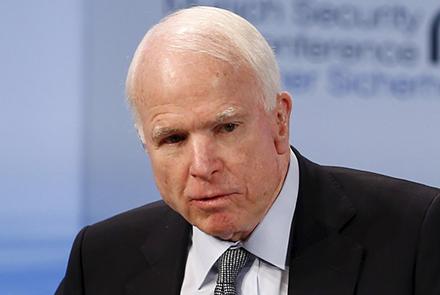U.S Senator John McCain said on Sunday in Islamabad that there could be no peace in Afghanistan or the rest of the region without Pakistan’s cooperation.
McCain, who serves as chairman of the Senate Armed Services Committee, met with Sartaj Aziz, advisor to Pakistani Prime Minister Nawaz Sharif, and the Pakistani army chief of staff general Qamar Javed Bajwa.
"Our relationship is more important perhaps than ever before," McCain said.
This comes after two U.S officials told Reuters last month that U.S President Donald Trump's administration is exploring hardening its approach toward Islamabad over Pakistan-based militants launching attacks in Afghanistan.
On Sunday, McCain, who was accompanied by senators Lindsey Graham, Elizabeth Warren, Sheldon Whitehouse and David Perdue, said: "We will not have peace in the region without Pakistan."
Aziz said that the strategic partnership between Pakistan and the United States "was critical to achieve peace and stability in the region and beyond".
U.S officials say they seek greater cooperation with Pakistan, not a rupture in ties
Reuters reported that experts on America's longest war have said militant safe havens in Pakistan have allowed Taliban-linked insurgents a place to plot attacks in Afghanistan and regroup after ground offensives. Critics claim Islamabad is not doing enough to crack down on militants such as the Taliban and its affiliated group, the Haqqani network.
Islamabad Urges Resumption of QCG process
Meanwhile, Pakistan’s ministry of foreign affairs said in a statement that Pakistan remained committed to supporting efforts for lasting peace and stability in Afghanistan.
“The adviser (Aziz) said that Pakistan remained committed to supporting efforts for lasting peace and stability in Afghanistan. Adviser noted that QCG process remains a credible and effective vehicle to facilitate reconciliation and restore peace, stability and economic prosperity in Afghanistan,” the statement reads.
The statement says Pakistan looked forward to constructive engagement with the United States on all efforts and initiatives that would lead to a stable and prosperous Afghanistan.
Aziz also said that Pakistan was ready to strengthen and deepen its partnership with the U.S to counter emerging terrorism threats including the expanding footprint of Daesh in the region.
McCain who has been a major critic of Pakistan has always criticized Islamabad’s role in the fight against the Taliban and its offshoot the Haqqani network.
The U.S delegation visits Pakistan at a time that Washington prepares to announce its new war strategy in Afghanistan which also includes the deployment of additional forces in the country which has been grappling with a rising threat and Taliban insurgency.
“Pakistan has major importance for the U.S in South Asia. Afghanistan is a landlocked country, it is much smaller than Pakistan in terms of population; in their conclusions, the U.S never dares to frustrate Pakistan,” said MP Abdul Wadoud Paiman.
“If the United States wants to honestly contribute in the war against terrorism, then it should strike terrorist safe havens and hideouts beyond the borders of Afghanistan,” said MP Farooq Majro, referring to terror hideouts and safe havens in Pakistan.
Bilateral relations between Afghanistan and Pakistan have faced ups and downs in recent years over what the Afghan government calls the dual role by Islamabad in tackling insurgent groups on its soil and not taking serious steps to help restore peace in Afghanistan.


